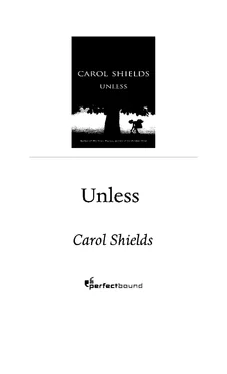Carol Shields - Unless
Здесь есть возможность читать онлайн «Carol Shields - Unless» — ознакомительный отрывок электронной книги совершенно бесплатно, а после прочтения отрывка купить полную версию. В некоторых случаях можно слушать аудио, скачать через торрент в формате fb2 и присутствует краткое содержание. Жанр: Современная проза, на английском языке. Описание произведения, (предисловие) а так же отзывы посетителей доступны на портале библиотеки ЛибКат.
- Название:Unless
- Автор:
- Жанр:
- Год:неизвестен
- ISBN:нет данных
- Рейтинг книги:4 / 5. Голосов: 1
-
Избранное:Добавить в избранное
- Отзывы:
-
Ваша оценка:
- 80
- 1
- 2
- 3
- 4
- 5
Unless: краткое содержание, описание и аннотация
Предлагаем к чтению аннотацию, описание, краткое содержание или предисловие (зависит от того, что написал сам автор книги «Unless»). Если вы не нашли необходимую информацию о книге — напишите в комментариях, мы постараемся отыскать её.
Unless — читать онлайн ознакомительный отрывок
Ниже представлен текст книги, разбитый по страницам. Система сохранения места последней прочитанной страницы, позволяет с удобством читать онлайн бесплатно книгу «Unless», без необходимости каждый раз заново искать на чём Вы остановились. Поставьте закладку, и сможете в любой момент перейти на страницу, на которой закончили чтение.
Интервал:
Закладка:
Here is an inventory of relics and fashion and a sentimental embrace of death, invoking what may well be the richest moments in a lifetime, the shrine of tears and aching history. People are astonished to find a piece of granite that has been carved into a life-size kicking infant, lying on his back and smiling and gurgling up at the clouds. “Our Little Jack,” the inscription reads, “Gone to Eternal Happiness.” The sight of this granite baby has always moved my daughters to tears. They always insisted, when they were younger and walking with me in the graveyard, on visiting little Jack, relishing their own tears as they stroked his curly stone head. The tragedy of it. A beloved child, snatched from his parents’ arms. Here’s where memory broke and shattered and was replaced by a frozen cherub, pawing the air with everlasting delight.
On another of the stones, ugly, vast, and arresting, is carved “Mary Leland, 1863–1921.”
Underneath are the simple words, “She Took Good Care of Her Chickens.”
This inscription is baffling, which is why people are drawn to it. The stonemason must have meant children, not chickens. That’s what some people think, that the chisel slipped slightly, imprinting a false message. But maybe there were no children for Mary Leland; maybe she really had nothing but poultry to serve and to advertise her charity. Or maybe a husband, embittered by his wife’s neglect, was mocking her in her grave. Lately, I’ve been trying to focus my thoughts on the immensity rather than the particular. This requires an act of will. I steer my thoughts away from Mary Leland’s chickens and, instead, focus on the rows of humped remains and tipped granite stones, three acres in all. So many people have died.
There are people who make a life out of dislocation. Tenancy is all they demand in their refusal to merge with particular neighbourhoods or rooms. But Tom is different. He burrows into the idea of home. I knew this from the beginning, from the first time we met, though I wasn’t able, then, to articulate the thought.
It is not true that people in long marriages dissolve into each other, becoming one being. I touch Tom’s elbow, the sleeve of his tan jacket; he places his long arms around me and his hands cup my breasts in the friendliest possible way. We are two people in a snapshot, but with a little cropping we could each exist on our own. But that’s not what we want. Hold the frame still, contain us, the two of us together, that’s what we ask for. This is all it takes to keep the world from exploding. There’s that tan jacket of his, a windbreaker with its zipper and smooth microfibres, nothing to call attention to itself, the most generic of garments. On the other hand, there are men, the composed, noisy men from Bay Street, who choose bright colours, teal or tangerine, for weekend wear, or else the skins of animals, goats, sheep, and so forth. They are men spangled with epaulettes, toggles, tabs, and insignias, the breezy rapists from the Nautica ads, cool and criminal in their poplins, shellacked with light, but they know they’re in costume, that they’ve made an effort that other men, men like Tom, aren’t forced to make.
My husband has only one childhood complaint: that his mother was a lousy housekeeper.
Once a year (maybe) she got around to scrubbing the soap dish in the bathroom. He remembers how the melting block of Palmolive sweated with its own bubbled dirt, an object of such disgust that he refused to touch it. No one, however, noticed his avoidance of soap.
This went on for years. No one thought it mattered, that every day his eyes met with soupy slop. He told me this in our early days together, wanting me to understand his fastidiousness about our bathroom arrangements and worrying that I might think he was one of those comically neurotic men you read about in novels. Unless you had a mother like that, you wouldn’t understand. And unless you had been given an alternative glimpse of orderliness, you wouldn’t mind. You needed to know about that silken bar sitting freshly in its little porcelain dish, that such an item was a possibility. Anyone’s childhood can be an act of disablement if rehearsed and replayed and squinted at in a certain light, but Tom for some reason has fully recovered from his fear of dirty soap dishes, and nowadays his mother has grown obsessive about household cleanliness and even uses that blue antiseptic water in her toilet.
We were talking about his mother as we made our way between gravestones. Lois Winters, née Maxwell, a widow for twelve years now. She worships her son, Tom, her only child, and adores her three granddaughters. She likes me well enough, I think, but there are great windy gaps between us. She has my books, for instance, all of them inscribed, stacked on her glass-topped coffee table, but she has never read a single one of them. This is something a writer can sense immediately. A wall of numb radar rears up and reveals itself when she hears one of my books mentioned. I understand this refusal of hers perfectly, and the reason for it. It has nothing to do with rejection and everything to do with me being the mother of her grandchildren and her son’s spouse. This arrangement cannot be challenged by my hobbies, my pastimes, my professional life, my passion.
She has changed since Norah went on the street, as though her brain has lingered too long, like a lettuce leaf in oil and vinegar, a slow deterioration. Since she has dinner with us every night — she brings the dessert, something sweet and homemade — we’ve been able to observe her gradual day-by-day withdrawal. There was a time, nevertheless, when she took a lively part in the conversation, asking the girls how they were liking their teachers, how the swim team was doing. Always a nettlesome woman, she had political opinions, rather conservative, it’s true, but opinions nonetheless, and she listened to the radio, kept up with public affairs.
“Where is Norah?” she kept asking. “When is Norah coming home?” Finally Tom told her, making a careful incremental story of it; Norah had dropped out of university, she had parted from her boyfriend, she was pursuing a path to spiritual goodness, which the family couldn’t quite understand, she was detaching herself from the rest of us, sleeping in a hostel, and yes, begging money at the corner of Bathurst and Bloor in downtown Toronto — but everyone held out hopes that she would return to being the Norah we knew and loved, that she would recover from whatever delusion had seized her, that we were doing everything we could for her and that she, as Norah’s grandmother, was not to worry.
Well, of course she is worried about her oldest granddaughter, her best-loved granddaughter, if the truth were declared, her darling Norah. She grew steadily more passive at the dinner table, then silent. In recent weeks, her growing silence has become an uncanny reflection of Norah’s silence, her posture is as defeated as Norah’s. I wonder sometimes if we have all — Tom, Natalie, Chris, Lois — become actors in Norah’s shadow play, if in these last few months we’ve turned wary, guarded, angered, waiting to be given back what we once had, each of us frozen to the bone and consigned to a place where nothing ever changes. Even Pet has slowed down, his dog-smile retriever’s face draped in acquiescence.
But that’s not true for life outside our house. I look around and I see all kinds of changes, some of them astonishing. For one thing, our friends Colin and Marietta Glass are back together again; the last thing we expected. She’s said goodbye to her lover in Alberta. The Glasses have forgiven each other for God only knows what transgressions and smoothed out their differences. It is astonishing, such an emotional reversal. Colin is tender and loving in her presence — I must admit, it’s a joy to see him helping her into her chair at the table — and she, in return, awards him a gaze as soft and uninjured as a young girl’s.
Читать дальшеИнтервал:
Закладка:
Похожие книги на «Unless»
Представляем Вашему вниманию похожие книги на «Unless» списком для выбора. Мы отобрали схожую по названию и смыслу литературу в надежде предоставить читателям больше вариантов отыскать новые, интересные, ещё непрочитанные произведения.
Обсуждение, отзывы о книге «Unless» и просто собственные мнения читателей. Оставьте ваши комментарии, напишите, что Вы думаете о произведении, его смысле или главных героях. Укажите что конкретно понравилось, а что нет, и почему Вы так считаете.












